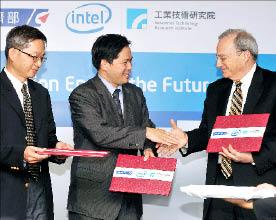Intel Corp yesterday unveiled its latest partnership with Taiwanese research powerhouse Industrial Technology Research Institute (ITRI, 工研院), a US$15-million research program that would run over the next five years to develop new-generation memory technologies for smaller and “greener” chips for mobile devices and cloud-technology-based data centers.
Intel would inject US$5 million in funding and resources, while ITRI and the Ministry of Economic Affairs would channel US$10 million into the research project.
Instead of developing process technologies for chip manufacturing, the collaboration aimed at finding the optimized structure of memory chips that could provide better performance with lower power consumption, vice president and chief technology officer of Intel Justin Rattner told a media briefing in Taipei.

Photo: CNA
“The partnership’s initial project will focus on super-fast, but extremely energy-efficient memory technologies for future ultra-mobile devices, such as Ultrabooks, tablets and smartphones, as well as tomorrow’s exascale and cloud mega-data centers,” Rattner said.
The general director of ITRI’s Information and Communications Research Laboratories, Wu Cheng-wen (吳誠文), said ITRI would focus on developing 3D IC technology to make memory chips work better with microprocessors, or to integrate memory chips with microprocessors.
“With the many patented technologies from Intel and ITRI’s solid 3D IC research and development capabilities, this collaboration will enable the development of future memory technologies,” Wu said.
“This project will also create a new field for local memory chip makers to produce chips [with more value] using their existing technologies, rather than scramble to invest massively on upgrading processing technologies,” he added.
The 3D IC technology for memory chips could effectively reduce the space required by hardware, enable faster data transmission and expand capacity to cope with the uptake of sleek consumer electronic devices, ITRI said.
Wu expects ITRI’s collaboration with Intel to bear fruit within three years, at the earliest. The research house would then transfer the memory technologies and patents to local companies interested in manufacturing new-generation memory chips.
The government-backed ITRI has long been playing a key role in developing cutting-edge technologies to support the development of Taiwan’s industries, particularly the semiconductor industry.
ITRI is in talks with Taiwanese semiconductor companies and mostly memory-chip companies to join this project, Wu said, adding that chip designers, chip packagers and contract chip makers have also expressed interest in participating in this program. He declined to reveal the names of the companies ITRI had approached.
Wu expects local companies to participate in the ITRI-Intel program for one year after the launch.

TAKING STOCK: A Taiwanese cookware firm in Vietnam urged customers to assess inventory or place orders early so shipments can reach the US while tariffs are paused Taiwanese businesses in Vietnam are exploring alternatives after the White House imposed a 46 percent import duty on Vietnamese goods, following US President Donald Trump’s announcement of “reciprocal” tariffs on the US’ trading partners. Lo Shih-liang (羅世良), chairman of Brico Industry Co (裕茂工業), a Taiwanese company that manufactures cast iron cookware and stove components in Vietnam, said that more than 40 percent of his business was tied to the US market, describing the constant US policy shifts as an emotional roller coaster. “I work during the day and stay up all night watching the news. I’ve been following US news until 3am

UNCERTAINTY: Innolux activated a stringent supply chain management mechanism, as it did during the COVID-19 pandemic, to ensure optimal inventory levels for customers Flat-panel display makers AUO Corp (友達) and Innolux Corp (群創) yesterday said that about 12 to 20 percent of their display business is at risk of potential US tariffs and that they would relocate production or shipment destinations to mitigate the levies’ effects. US tariffs would have a direct impact of US$200 million on AUO’s revenue, company chairman Paul Peng (彭雙浪) told reporters on the sidelines of the Touch Taiwan trade show in Taipei yesterday. That would make up about 12 percent of the company’s overall revenue. To cope with the tariff uncertainty, AUO plans to allocate its production to manufacturing facilities in

Six years ago, LVMH’s billionaire CEO Bernard Arnault and US President Donald Trump cut the blue ribbon on a factory in rural Texas that would make designer handbags for Louis Vuitton, one of the world’s best-known luxury brands. However, since the high-profile opening, the factory has faced a host of problems limiting production, 11 former Louis Vuitton employees said. The site has consistently ranked among the worst-performing for Louis Vuitton globally, “significantly” underperforming other facilities, said three former Louis Vuitton workers and a senior industry source, who cited internal rankings shared with staff. The plant’s problems — which have not

TARIFF CONCERNS: The chipmaker cited global uncertainty from US tariffs and a weakening economic outlook, but said its Singapore expansion remains on track Vanguard International Semiconductor Corp (世界先進), a foundry service provider specializing in producing power management and display driver chips, yesterday withdrew its full-year revenue projection of moderate growth for this year, as escalating US tariff tensions raised uncertainty and concern about a potential economic recession. The Hsinchu-based chipmaker in February said revenues this year would grow mildly from last year based on improving supply chain inventory levels and market demand. At the time, it also anticipated gradual quarter revenue growth. However, the US’ sweeping tariff policy has upended the industry’s supply chains and weakened economic prospects for the world economy, it said. “Now